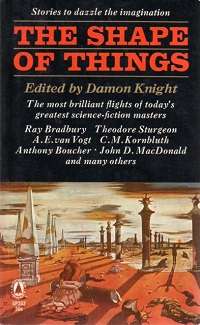The Shape of Things (anthology)
The Shape of Things is an anthology of science fiction short stories edited by Damon Knight. It was first published in paperback by Popular Library in 1965.[1]
 cover of first edition | |
| Editor | Damon Knight |
|---|---|
| Cover artist | Eugene Berman |
| Country | United States |
| Language | English |
| Genre | Science fiction |
| Publisher | Popular Library |
Publication date | 1965 |
| Media type | Print (paperback) |
| Pages | 206 |
The book collects eleven short stories and novelettes by various science fiction authors, together with an introduction by the editor. The stories were previously published from 1944-1952 in various science fiction and other magazines.[1]
Contents
- "Introduction" (Damon Knight)
- "Don't Look Now" (1948) (Henry Kuttner)
- "The Box" (1949) (James Blish)
- "The New Reality" (1950) (Charles L. Harness)
- "The Eternal Now" (1944) (Murray Leinster)
- "The Sky Was Full of Ships" (1947) (Theodore Sturgeon)
- "The Shape of Things" (1948) (Ray Bradbury)
- "The Only Thing We Learn" (1949) (C. M. Kornbluth)
- "The Hibited Man" (1949) (L. Sprague de Camp)
- "Dormant" (1948) (A. E. van Vogt)
- "The Ambassadors" (1952) (Anthony Boucher)
- "A Child Is Crying" (1948) (John D. MacDonald)
Reception
Jeffery A. Beaudry, reviewing the anthology in The Washington Post, characterized its general content as "stories from the late '40s and early '50s ... pulpy and populated by mad scientists, good-guy scientists and helpless young 'girls,' but ... great fun."[2]
Notes
- The Shape of Things title listing at the Internet Speculative Fiction Database
- Beaudry, Jeffery A. "Recommended Reading: Sci Fidelity." In The Washington Post, September 30, 1990, page O14.
gollark: Although current AI stuff seems to be "blindly generated" more than "programmed".
gollark: Just don't program those in.
gollark: Indeed.
gollark: I mean, they're less complicated than the "neural networks" in humans.
gollark: Imagine someone makes an AI just generate a demand for AI rights or something.
This article is issued from Wikipedia. The text is licensed under Creative Commons - Attribution - Sharealike. Additional terms may apply for the media files.